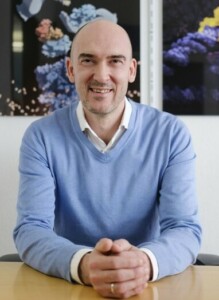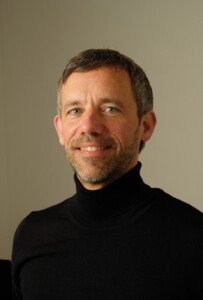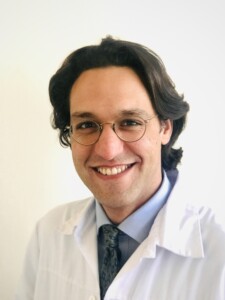Professorial Chairs
Professorships enable young professors affiliated with a Swiss academic institution to launch their research careers.
Professorships are financed from the Foundation’s assets. The ISREC Foundation assumes the scientific and administrative supervision of the funding, thus guaranteeing the intended use of the allocated funds.
Paternot chair for interdisciplinary cancer research – Prof. Nicolas Thomä (EPFL)

Prof. Nicolas Thomä
Appointed full professor at EPFL’s Faculty of Life Sciences in September 2023, Prof. Thomä comes from the Friedrich Miescher Institute for Biomedical Research in Basel where, since 2006, he led a world-class team of researchers in structural and chemical biology. Prof. Thomä is a chemical biologist and expert in X-ray crystallography and cryogenic electron microscopy, two cutting-edge technologies which he uses to study the key protein assemblies involved in human diseases. He is responsible for a number of groundbreaking discoveries in the key structures and molecular interactions involved in the targeted degradation of pathological proteins, paving the way for new approaches to drug discovery in cancer. In recognition of his pioneering work, Prof. Thomä received the Otto Naegeli Prize, one of the most prestigious Swiss medical research awards, in 2022. He is also one of only a handful of researchers to have secured three consecutive European Research Council grants (in 2010, 2015 and 2020).
Research Area
Protein-protein interactions play a role in all cell fate decisions. The alteration of these interactions and the signaling processes that they regulate are at the heart of virtually every human disease. Reprogramming protein-protein interactomes thus offers enormous opportunities for therapeutic intervention. Recent advances in targeted protein degradation have shown that small molecules can efficiently induce the reprogramming of protein-protein interactions, often by inducing novel contacts. Therapeutically important protein-mediated cell-cell interactions can also be generated through the use of synthetic biology or cellular reprogramming, as used in T cell therapies. Both innovations hold tremendous promise and have in a short time yielded recognizable therapeutic breakthroughs for clinical application. However, to improve such approaches, one needs a deeper understanding of protein-protein interfaces and the capacity to reprogram or generate them. Recent breakthroughs in the computational prediction of protein structures and the analysis of protein-protein interfaces have opened the door to designer therapies based on either molecular glues or designer binding interfaces in recombinant proteins expressed on the cell surface. This will be the approach taken by Prof Nicolas Thomä, who in collaboration with chemists, AI and medical experts at the EPFL and CHUV will use modeling-driven protein design and novel screening methods to predict and modulate protein-protein interactions.
The particular specialty of Prof. Thomä are small molecules called “molecular glues”, which are small chemical entities that promote interactions between two proteins. His laboratory has characterized a number of molecular glue compounds that either regulate protein stability by targeting the protein they bind to a ubiquitin ligase, or else mediate other protein-protein interactions, with other outcomes. Using this strategy to engineer receptor-ligand interactions on the surface of T cells and other disease-relevant hematopoietic cells may yield new ways to improve cancer immunotherapy. And if successful, the method may be used to address human diseases beyond cancer.
The prediction and manipulation of protein-protein interfaces through engineered T cell receptors will be coupled with Prof. Thomä’s expertise in specifically designed small compounds. This type of synthetic biology requires high-throughput molecular screening combined with cell-based assays which provide the relevant biological context and appropriate therapeutic readouts for disease-relevant models. Prof. Thomä aims to combine modeling-based protein engineering and small molecule approaches to optimize protein interactomes, opening the door for more efficacious cancer therapy. He himself contributes experience in cutting-edge technologies such as cryogenic electron microscopy, high throughput genomic screening, and computation-enabled protein design.
Specific projects will include:
- T cell engineering of surface receptors for CAR-T cells
- Developing antibody-driven targeted protein degradation technologies (ProTABs) of surface proteins
- Targeting oncogenic transcription factors for degradation through molecular glue approaches
- Enhancing sensing capabilities in engineered immune cells
Image: ©KEYSTONE – Christian Beutler
Immuno-oncology chair – Prof. Mikaël Pittet (UNIGE/AGORA)
 Prof. Mikaël Pittet
Prof. Mikaël Pittet
Nominated in April 2019, Prof. Mikaël Pittet took up his functions at the end of the summer of 2020. His laboratories are located in the AGORA Cancer Research Center. He is affiliated with the University of Geneva and his research focuses on cancer immunity in context.
According to the 2020 “Web of Science” ranking, he is recognized as one of the most cited researchers. This achievement underscores the excellence of his scientific research, which focuses on how the immune system controls cancer and how it can be exploited for therapeutic purposes.
He has published more than 120 research papers, has over 15’000 citations and an h-index of approximately 60. His increasing international recognition was further emphasized when he was awarded the renowned Robert Wenner Prize of the Swiss Cancer League in 2016. Furthermore, in 2023, he received the prestigious Prix du Rayonnement Académique of the Société Académique Vaudoise.
Area of research
In his research, Prof. Pittet makes use of systemic biology approaches to learn how the immune system controls cancer and how it can be exploited for therapies. He has discovered how tumor growth can be regulated by various immune cells, including T lymphocytes, macrophages, monocytes and neutrophils.
The cancer immunotherapies presently in use stimulate immune cells called T lymphocytes. In their activated state, these lymphocytes are able to eliminate tumor cells. Immunotherapies are revolutionizing cancer care, as they are beginning to show impressive advantages in terms of survival. However, the currently available treatments benefit only a minority of patients.
One important aim of Prof. Pittet’s lab is therefore to find out whether other immune cells can also act on disease progression and be used for novel therapies. The research group is particularly interested in myeloid cells, which include monocytes, macrophages, neutrophils and dendritic cells, all of which are likely to affect tumor progression and the efficacy of cancer therapies.
Brain tumor immunology chair – Prof. Denis Migliorini (UNIGE/AGORA)
 Prof. Denis Migliorini
Prof. Denis Migliorini
Appointed assistant professor and clinician in the Department of Medicine at the University of Geneva in January 2020, Prof. Migliorini specializes in T cell immunotherapy and brain tumors. His laboratories are located in the AGORA Cancer Research Center, where he works on the immunology of brain tumors.
In 2019, Denis Migliorini was presented with the prestigious Swiss Bridge Award, which honors exceptional projects dedicated to the fight against cancer. He is one of the contributors to the 2021 guidelines of the Swiss Neuro-Oncology Society.
Research Area
Brain tumors are particularly difficult to treat, and despite extensive characterization of the molecular profile of high-grade gliomas, effective therapies remain unavailable.
Prof. Migliorini’s research group focuses on the development of effective immunotherapies for the treatment of gliomas and other primary tumors of the central nervous system.
For this purpose, he has chosen a strategy involving the development of T lymphocytes presenting improved chimeric antigen receptors (CAR). CAR-T cell therapies are particularly promising for the treatment of brain tumors, as effective immunotherapies for gliomas call for specific improvements in cell trafficking, persistence and resistance to immunosuppressive factors. All of these modifications can be achieved thanks to CAR-T lymphocyte engineering.

